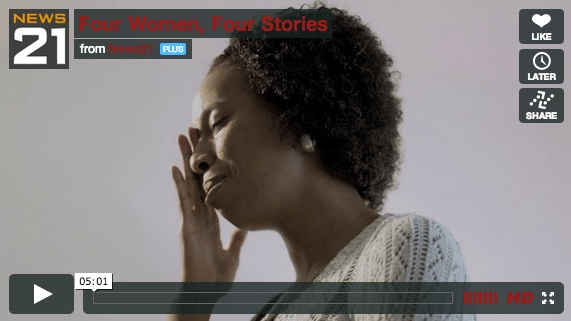
Investigative project on veterans teaches student journalist new skills
News 21, an investigative project by students administered by Arizona State University and supported by Knight Foundation, recently published “Back Home: The Enduring Battles Facing Post-9/11 Veterans.” Below, Jessica Wilde, one of 26 student journalists from 12 universities who participated in the project, writes about her experience as part of the reporting team. Above: A New York veteran searches for a stable career.
Before News21, most of the articles I had written were quick stories for the University of Maryland’s Capital News Service. I always had more than one story going, and I tried to spend as much time in the field as possible. Related Link
“Student-led investigation reveals challenges facing veterans” by Elizabeth R. Miller on KnightBlog
News21 changed that focus. We were working on a national project, instead of state or local stories. We had ample time to become very familiar with our topics, doing detailed research in the office. When we traveled, we traveled all over the country.
We were covering issues affecting post-9/11 veterans, but we were assigned to different teams to explore specific topics: homelessness, suicide, employment, health and disability claims. I spent the six months leading up to the summer learning about the Department of Veteran Affairs claims process, while I finished my master’s in multiplatform journalism.
When I started the summer program, Jacquee Petchel, News 21’s executive editor, asked me to write the overview story for the health team. I was excited to learn what my story would be and jumped into the research. I read inspector general and Government Accountability Office reports. I examined Veterans Affairs documents and data. I learned to find meaning in bureaucratic government language.
When I had done enough research in the office, I went into the field. I visited a Veterans Affairs polytrauma center in San Antonio and interviewed a veteran who had lost both of his legs to a roadside bomb blast in Afghanistan.
I drove with another reporter from Phoenix to Las Vegas, Las Vegas to Reno, Reno to Los Angeles. We interviewed veterans waiting for their disability claim and claims processors who told us about the issues they saw. We also interviewed a veteran who lost his arm and the use of both legs in Iraq; his family now takes care of him full time.
When I returned to Phoenix, I drove down to Tucson with two other reporters to interview four wounded veterans at another polytrauma center. I became a better interviewer in the process. There were so many opportunities to learn what questions to ask, what details to find. I also learned from the other reporters with me. Their techniques for shooting video and the way they approached difficult topics expanded my skills. We were able to do a two-camera shoot, which I had never done before, and we fed off each other’s questions, so we could make sure we heard the complete story of what happened the day each was injured, what Iraq smelled like, what it felt like.
Jacquee’s morning meetings kept us in line. She reminded us to ask for details like what the soldiers carried with them in war, so we could enrich our stories. She loved storytelling and helped us all appreciate it. But she also focused on what the news was in each story. She helped me cut 1,000 words from my first draft, sharpening the narrative and transforming what felt like a research paper into an authentic news story.
I wrote that first draft on a yellow legal pad. Five weeks later, Len Downie, a former executive editor of The Washington Post and a professor at Arizona State, called me into the glass conference room in the middle of our newsroom, where he had spent the week reading every story that was ready for him.
Len brought a whole new perspective. He quickly reorganized the story to make it more comprehensible. He watched my videos and pointed out questions that readers would ask and that I should answer.
A month later, we saw the finished product—all of our hard work on one website, full of graphics and videos and powerful stories—all with one very important purpose that Jacquee and Len made sure we never forgot: to inform the public of the issues facing this group of veterans and to make changes to better serve them. In the process, we all became better reporters.
Jessica Wilde recently earned a master’s degree in multiplatform journalism with an emphasis on video storytelling from the University of Maryland. She also holds a bachelor’s degree in English and creative writing from George Washington University.
Recent Content
-
Journalismarticle ·
-
Journalismarticle ·
-
Journalismarticle ·


